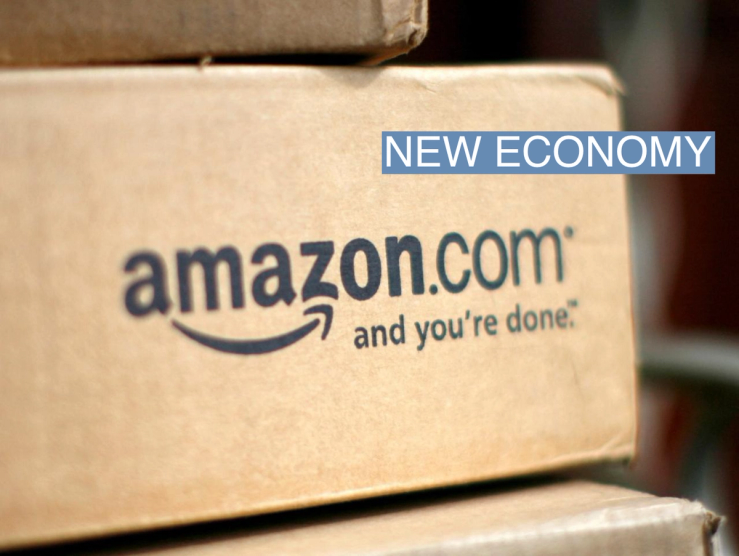The News

Amazon has radically transformed small businesses in both the U.S. and China, making them dependent on the e-commerce giant while also obscuring their existence, according to a new report published Wednesday by Data & Society.
The foundation-supported research institute spent over a year interviewing 40 current and former merchants on Amazon, who described a largely hidden economy that bears little resemblance to the traditional retail industry. The company’s alleged unfair treatment of its third-party sellers has previously come under scrutiny in Congress and by antitrust watchdogs in several states.
But a number of merchants stressed that they don’t all see themselves as victims. Rather than simply making their livelihood worse, Amazon changed how their jobs function. “It’s less like running a mom-and-pop than like day trading,” said Moira Weigel, a communications professor at Northeastern University who authored the report. Selling on Amazon “blurs the lines between small business and gig work.”
Amazon lists products on its website in two different ways, though it’s not always easy for consumers to tell the difference. First, like any brick-and-mortar shop, it buys merchandise from wholesale manufacturers and then marks up the price.
But it also operates a marketplace akin to eBay — with one crucial difference. The majority of third-party sellers rely on Amazon not just to market their goods, but also for shipping and logistics, making it easy to miss that a pair of flip-flops or a spatula came from an independent company (especially when the package arrives in an Amazon box).
There were an estimated six million merchants on Amazon’s marketplace in 2021, and around 2,000 opened new accounts each day. On average, Amazon collects 34% of each sale they make, according to research published the same year by the Institute for Local Self-Reliance. Estimates from 2020 showed that around 54% of Amazon sellers in the U.S. market were based in the country, while 40% were in China.
What’s new about Weigel’s report is that it illustrates how Amazon sellers built their companies by adapting to the specific quirks of the e-commerce giant, rather than by using Amazon to support their own businesses within the wider market. Amazon often touts the ways it helps smaller enterprises, but in reality, it spurred the creation of an army of contractors who are reliant on it, she argues.
“When I first began this research, I had naively thought that when I spoke to Amazon sellers, I would be speaking to people who had pre-existing businesses,” Weigel said. “But the people I talked to — for better or worse — have to create businesses that are designed around Amazon.”
One seller, for example, told Weigel how she got started on Amazon by peddling shoe inserts, a product she chose randomly after buying a book in Beijing about “how to become a billionaire selling on Amazon in China.”
The seller said she spends 80% of her time optimizing the keywords she uses in her product descriptions and advertisements, in order to ensure her goods rank highly in Amazon’s search results. “I don’t use any other social media channels to draw traffic to my store,” she told Weigel.
A spokesperson for Amazon said there was a “wide range of public information” contrary to the claims Weigel makes in her research. They pointed to Amazon’s Small Business Empowerment report released in November, which says Amazon has two million selling partners worldwide, who have created an estimated 1.5 million jobs in the U.S. as of 2021.
In this article:
Louise’s view
At a time when relations between the U.S. and China are deteriorating, American consumers are closer than ever before to the Chinese manufacturers producing much of what they buy. But their relationship is mediated through Amazon.
While the company shut down its Chinese marketplace in 2019, it has continued courting merchants in the country, including by co-sponsoring conferences and courses to recruit and train them in cities like Shenzhen, Shanghai, and Hangzhou, the report found. (Amazon said it hosts conferences in many parts of the world.)
“Amazon is a platform that is so deeply enmeshed in China in a lot of different ways,” said Weigel, who speaks Mandarin.
While plenty of American companies source their products from the People’s Republic, Amazon sellers there are unique in that they are responsible for managing their own inventory and marketing strategy, giving them a detailed portrait of the shopping habits of U.S. consumers.
One seller in Shenzhen, for instance, showed Weigel a spreadsheet detailing some of the products her company sold. At the top, it listed three items next to corresponding photos and keywords: “tactical boots, pistol bag for handguns and ammo, and throwing axes tomahawks.”
“This kind of thing,” she texted Weigel, “is very hot in America.”
Weigel said the sellers she interviewed in China often described their roles as divorced from politics. The owner of an outerwear brand in Shanghai, for instance, told her he didn’t care about former House Speaker Nancy Pelosi’s visit to Taiwan, he just wanted customers to like his coats.
“People connect intimately through commerce,” Weigel said. “That’s a kind of connection that’s somehow less problematic or complicated than the political.”
Room for Disagreement
Amazon’s relationship with Chinese sellers isn’t as cozy as it used to be. Some say they are frustrated with the company’s high fees and confusing policies. In 2021, the e-commerce giant permanently banned hundreds of Chinese brands for allegedly buying fake reviews and violating other rules, a crackdown that sent shockwaves through the country’s Amazon selling community.
“Amazon cracks down on Chinese sellers every year,” one merchant told the Chinese tech news site PingWest. “In the face of this risk, basically no Chinese company dares to say that it will rely entirely on the Amazon platform to survive in the future.”

